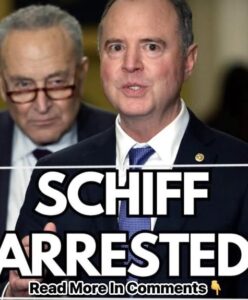Report Reveals Allegations About Adam Schiff’s Role in Classified Leaks

Recently unsealed FBI interview notes are stirring up controversy, reviving long-running accusations that Senator Adam Schiff authorized the leaking of sensitive information during the Trump-Russia investigations.
The documents reference testimony from a whistleblower — a Democratic staffer on the House Intelligence Committee — who told the FBI that, between 2017 and 2023, Schiff encouraged classified leaks designed to politically damage Donald Trump. At that time, Schiff was the committee’s top Democrat and later became chairman.
According to the whistleblower, Rep. Eric Swalwell (D-CA) was often the go-between for those leaks, which were said to bolster the so-called “Russiagate” narrative.
One FBI summary reads: “In an all-staff meeting called by SCHIFF, he told the group they would leak derogatory classified information about President DONALD J. TRUMP. SCHIFF said this information would be used to indict the President.”
Swalwell has rejected these claims, suggesting that FBI leadership — particularly Director Kash Patel — is politically motivated against him.
The whistleblower further alleged that Schiff once dangled the prospect of becoming CIA Director if Hillary Clinton had won the 2016 election. After her loss, Schiff allegedly pressed ahead with efforts to use leaks to weaken Trump’s presidency. The source said they personally saw Schiff authorize such disclosures and reported it to authorities — only to be fired shortly after approaching the FBI.
Investigative reporter Paul Sperry (Real Clear Investigations) has added to the claims, asserting that Schiff’s leaks may have been channeled to Washington Post reporter Ellen Nakashima, who has been linked in past reports to stories sourced by senior intelligence figures like former CIA Director John Brennan. Sperry pointed to declassified records suggesting Nakashima helped publish several key Russia probe stories between 2016 and 2017 — pieces that fueled public suspicion of collusion between Trump’s campaign and Moscow.
Critics argue that, if Schiff indeed sanctioned the release of classified material, it would represent a grave violation of national security and potentially criminal conduct. The House Intelligence Committee routinely handles highly sensitive information, and its members are legally bound to safeguard it.
Schiff’s office has not yet responded to these new allegations. In the past, he has flatly denied ever leaking classified information, accusing opponents of trying to discredit his oversight of the Trump administration.
The revelations highlight persistent partisan battles over how intelligence and law enforcement powers were used during and after the 2016 election. For now, it’s uncertain whether these disclosures will result in criminal charges.
Still, the most explosive detail is the whistleblower’s claim that leaks weren’t rogue staff decisions, but rather directives delivered by Schiff himself in an official meeting. If confirmed, this could carry severe political and legal fallout for Schiff, who now serves in the U.S. Senate. He, however, continues to insist he has done nothing wrong despite repeated accusations over the years.